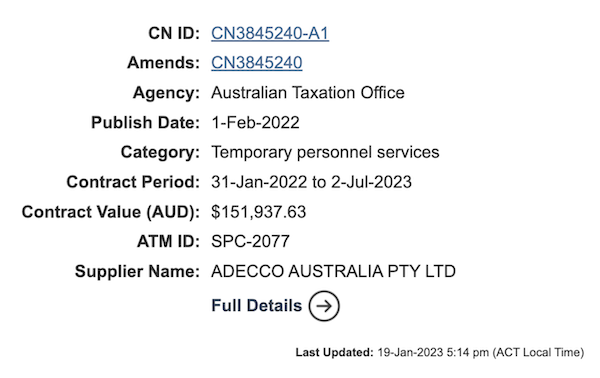Big 4 consultancy PwC has been caught red-handed with partners leaking confidential information, obtained while advising the Federal government on combating tax avoidance, so their multinational clients could avoid tax. As the government ponders its response, Rex Patrick argues it’s time to introduce a procurement black list to deal with corporate cowboys.
A failure of public governance
Who in their right mind would engage a player to bat for two different teams in the same competition? As it turns out, the Australian Government does, and they do so as a matter of routine.
Recent improper conduct inside consulting firm PwC has drawn attention to the practice. Their head of international tax, Peter Collins, who regularly attended a consultation group set up by the Treasury and by the Board of Taxation to provide confidential advice to government on measures to combat international tax avoidance, has been caught sharing confidential documents setting out proposed legislation and policy positions with other PwC personnel both in Australia and overseas, who in turn disclosed it to their corporate clients or potential clients.
Yes, it’s a gross breach of trust by PwC, and I’ll come to how the government should properly respond, but it’s also a massive governance failure by Government which itself created the environment that allowed it to occur.
Australian Greens Senator Barbara Pocock has quite correctly jumped on the issue. The five large consulting firms (Accenture, KPMG, Deloitte, PwC and EY) are between themselves raking in some $2 billion annually in government contracts, but also consulting on the same topics to private industry who have much to win from government insider information.
A Portrait in Cadging: PwC’s grants-for-grants rort, consulting bonanza, even a sweatshop
Whether it’s giving both tax advice to government and to corporate clients, or giving strategy advice to Defence and to an arms manufacturer, or assisting in the development of health policy and advising big pharmaceuticals on sales strategies, playing both sides of the line has to stop. The one upside of PwC’s indiscretion is it gives the government a clear opportunity to act.
A failure to respond
In terms of responses to PwC’s breach of trust, the partner Mr Collins has had his registration as a tax agent cancelled for two years and he no longer works at PwC. PwC has been ordered to provide training every six months to relevant partners and staff on how to handle conflicts of interest.
Former Liberal assistant treasurer Michael Sukkar has rejected calls for the government to stop consulting PwC on tax policy saying that disciplinary action should be targeted at individuals rather than the big four firm. That’s the sort of politically stupid statement that will ensure the Liberal Party will remain in opposition for years to come. Rather than trying to ensure PwC’s Liberal Party donations exceed those to the Labor Party, Sukkar ought to spend a little bit of time reading Michael West Media.
More needs to be done. While all consulting firms need to be forced to operate on only one side of the line, PwC’s breach of ethics and professional standards ought to result in the firm being black-listed from all government work for the next two years.
But can that be done?
Confronted by corporate cowboys, turn to the Indians
Australia could learn from India when it comes to dealing with corporate cowboys.
India has a procurement ‘black ban’ policy; a policy often exercised when companies have engaged in bribery, tender fixing, fraud, negligence, misbehaviour or malpractice, persistent or intentional breaches of contract conditions, or failed to fulfil a contract (including quality expectations), even disloyalty to the State.
It’s not a policy supported by any particular statute, rather it’s inherent in the government’s right to decide who wins a contract. It’s a policy that has been accepted and supported by India’s Supreme Court.
The Supreme Court properly finds that equality of opportunity must apply to matters of public contracts. Whilst individuals and businesses can choose not to deal with any third party, the government can’t choose to exclude third parties by discrimination.
But the Indian Government can black ban on the basis of poor supplier conduct or performance, subject to some reasonable court-imposed limitations. The government must apply procedural fairness and therefore issue a ‘show cause’ notice, providing the opportunity to the business to be heard. The government must also be proportional in its response and an entity cannot be permanently blacklisted.
There are judicial review rights which keep the right pressure on government officials to get black ban right. However, no company in their right mind would initiate costly proceedings in circumstances where matters aired in open court will further damage corporate reputation.
Australia’s procurement playing field
Section 5.3 and 5.4 of the Commonwealth Procurement Rules spell out the Australian government’s procurement framework as non-discriminatory and states that potential suppliers must be treated equitably based on the commercial, legal, technical and financial abilities and not be discriminated against due to their size, degree of foreign affiliation or ownership, location, or the origin of their goods and services.
The rules do recognise an ability to exclude tenderers if their practices are dishonest, unethical or unsafe; where the tenderer has a judicial ruling against them relating to employee entitlements and resulting orders have not been settled; or where a tenderer is bankrupt, insolvent, has made false declarations or where significant deficiencies in performance have occurred under a previous contract. However, in practice this amounts to a weak and reactive regime rather than a black-list policy which is strong and proactive.
Ramp it up Katy
There is no need for the government to seek Parliamentary approval to implement a proactive black-ban policy. The Commonwealth Procurement Rules are an instrument created under section 105B of the Public Governance, Performance and Accountability Act 2013. The rules are within the total and unilateral control of Finance Minister, Senator Katy Gallagher. The rules she makes are not subject to disallowance by the Parliament.
The government and its agencies have taken a wet lettuce leaf approach in trying to shape good corporate conduct. The Australian government’s procurement budget is a massive $81 billion per annum and offers great conduct altering leverage. If the ability to win government contracts were contingent on good behaviour, we’d see a lot fewer corporate cowboys.
Remedy for other misconduct
Black banning could also be a remedy for questionable areas of tax conduct by companies, shifting the burden of establishing proper tax conduct from the government to the corporation.
Take Adecco Holdings Pty Limited, a Swiss owned entity that operates ‘Australia’s Leading Recruitment Agency’. In the last eight tax transparency years it has generated $4.4 billion in revenue but paid nothing in corporate tax. It’s hardly a believable proposition that the company has made no profits, yet its Swiss headquarters keeps the business running.
Adecco has significant contracts with the Federal government. Not only does the ATO appear to be doing little about its incomprehensible tax position, they’re actually engaging them for labour hire.
A black listing could also be tool to deal with companies which have committed environmental, cultural and heritage abuses.
PwC show cause
PwC cannot be allowed to walk away from its confidentiality breach with a punishment only focused on the individual. And the government needs to establish a black ban regime. The stars are aligned. Australians are sick and tired of companies operating here without a social licence.
The Government needs to get cracking, and as part of an opening shot, issue its first show cause notice to PwC.
Rex Patrick is a former Senator for South Australia and, earlier, a submariner in the armed forces. Best known as an anti-corruption and transparency crusader, Rex is also known as the "Transparency Warrior."


